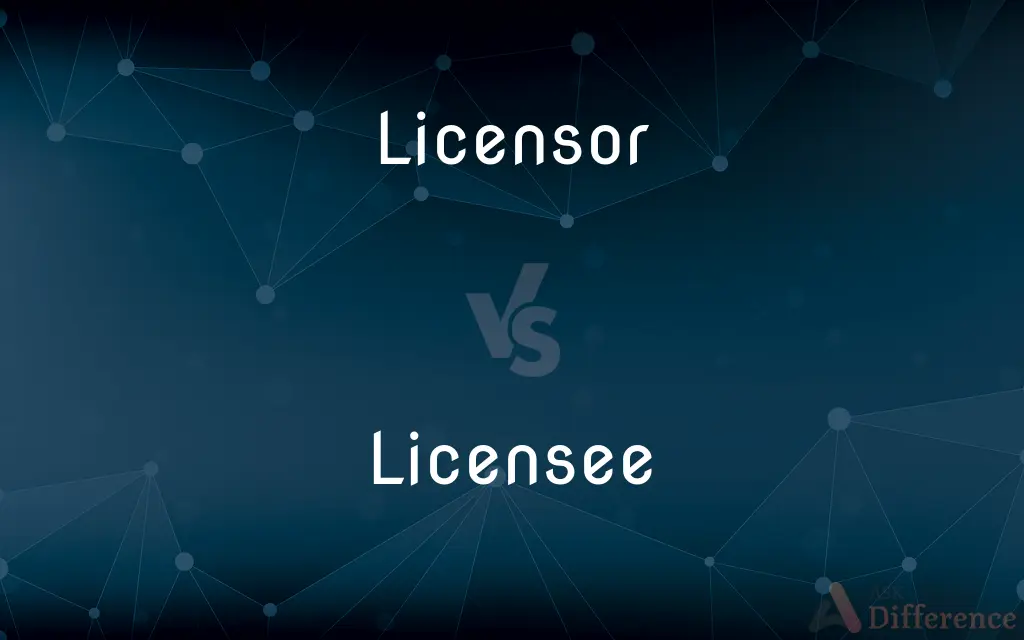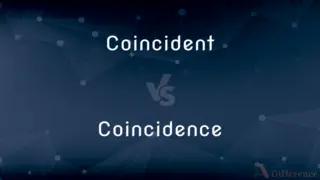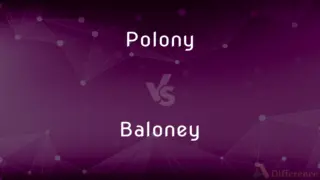Licensor vs. Licensee — What's the Difference?
By Tayyaba Rehman & Urooj Arif — Updated on February 21, 2024
A licensor grants the rights to use intellectual property, while a licensee is the recipient of those rights, authorized to use the property under agreed terms.

Difference Between Licensor and Licensee
Table of Contents
ADVERTISEMENT
Key Differences
The licensor is the owner or holder of intellectual property (IP) rights, such as copyrights, patents, or trademarks, and has the authority to grant permission for their use. The licensee, on the other hand, is the individual or entity that receives permission from the licensor to use the IP within the scope defined by a licensing agreement.
Licensing agreements are legal contracts where the licensor specifies the terms under which the licensee can use the IP, including duration, geographic area, and any financial arrangements like royalties. The licensee agrees to adhere to these terms and often pays the licensor for the rights granted, which can include upfront fees, royalties, or both.
The licensor retains ownership of the IP and can impose restrictions on how the licensee uses it, ensuring the IP is not misused or devalued. The licensee benefits from the ability to legally use, sell, or distribute the IP, often as part of their own products or services, without owning it outright.
Both parties benefit from a licensing agreement: the licensor generates revenue and extends the IP's market reach, while the licensee gains access to valuable IP that can enhance their offerings. However, both must manage the relationship to ensure compliance with the agreement and protection of the IP rights.
Disputes can arise if the licensee violates terms, such as using the IP beyond the agreed scope or failing to pay royalties, leading to legal action by the licensor. Thus, clear, detailed agreements and mutual respect for IP rights are crucial in the licensor-licensee relationship.
ADVERTISEMENT
Comparison Chart
Role
Grants rights to use IP
Receives rights to use IP
Ownership
Retains ownership of IP
Does not gain ownership of IP
Agreement
Defines terms of IP usage
Agrees to terms of IP usage
Financial Arrangements
Receives payment for IP use
Pays for the right to use IP
Compliance
Monitors IP use for adherence to terms
Must use IP within agreed terms
Compare with Definitions
Licensor
A licensor owns intellectual property and allows others to use it.
Disney, as a licensor, grants companies rights to produce merchandise featuring its characters.
Licensee
Must comply with the licensor's terms, including usage limits.
A software developer uses licensed coding libraries within agreed-upon terms.
Licensor
Receives royalties or fees from the licensee.
A patent holder earns royalties each time the patented invention is sold by a licensee.
Licensee
A licensee is authorized to use someone else's IP under certain conditions.
A small business becomes a licensee to sell branded sports apparel.
Licensor
Can revoke licenses if terms are violated.
A licensor might terminate a license if the licensee breaches contract conditions.
Licensee
Pays the licensor for the rights to use the IP.
A manufacturer pays to use a patented technology in its products.
Licensor
Retains control over how their IP is used.
An author approves specific book formats and translations as part of a licensing deal.
Licensee
Benefits from the value of the licensed IP without owning it.
A retailer gains customer interest by offering licensed popular character merchandise.
Licensor
Sets terms for IP usage in licensing agreements.
A software company licenses its program, specifying permitted uses.
Licensee
Risks penalties or loss of license for non-compliance.
A company might lose its license to distribute a popular video game if it violates agreement terms.
Licensor
A document, card, plate, or tag that is issued as proof of official or legal permission.
A driver's license.
Licensee
The person to whom a license is given.
Licensor
To grant a license to or for; authorize.
Licensee
Someone to whom a license is granted.
Licensor
A contract allowing someone to use a proprietary product or service.
Has a site license for that software.
Common Curiosities
Can a licensee sublicense the rights they've been granted?
Only if the licensing agreement specifically allows sublicensing, and even then, it's usually subject to the licensor's approval.
Can a licensor use their IP after licensing it out?
Yes, licensors retain ownership and can use their IP, license it to others, or even sell it unless the agreement states otherwise.
How does a licensing agreement affect the value of a company's IP?
Effective licensing can enhance the value of IP by demonstrating its marketability and generating revenue, but poor management or overly restrictive terms can diminish its value.
How are royalties typically calculated in a licensing agreement?
Royalties can be a fixed amount, a percentage of sales, or based on other metrics agreed upon in the licensing contract.
Can a licensing agreement be exclusive or non-exclusive?
Yes, agreements can be exclusive, granting rights to only one licensee, or non-exclusive, allowing multiple licensees to use the IP.
What is a territory in the context of licensing agreements?
Territory defines the geographical area where the licensee is authorized to use the IP, which can range from specific locations to worldwide rights.
What happens if a licensee violates the licensing agreement?
The licensor can take legal action, potentially resulting in penalties for the licensee or termination of the license.
How long does a licensing agreement last?
The duration is set in the agreement and can vary widely, from a few years to indefinitely, depending on the IP and the terms negotiated.
Can a license be terminated early, and under what circumstances?
Yes, licenses can be terminated early if either party breaches the agreement's terms or under mutually agreed conditions specified in the contract.
How do licensors ensure their IP is being used appropriately by licensees?
Licensors may include audit rights in the agreement, allowing them to inspect the licensee's operations and records to ensure compliance.
What is a cross-licensing agreement?
In a cross-licensing agreement, two parties grant each other licenses to use certain IP, often to facilitate collaboration or avoid litigation.
Can a licensee negotiate the terms of a licensing agreement?
Yes, terms are often negotiated before the agreement is finalized to ensure it meets the needs and protects the interests of both parties.
What is the difference between a license and a franchise?
A license allows use of IP under specific terms, while a franchise involves a broader relationship, including business models, branding, and operational guidelines.
Are there any industries where licensing is particularly common?
Licensing is prevalent in industries like entertainment, software, technology, fashion, and consumer products, where IP plays a central role in business models.
Can a licensing agreement include performance obligations for the licensee?
Yes, agreements may stipulate performance requirements, such as minimum sales targets or marketing efforts, to maintain the license.
Share Your Discovery

Previous Comparison
Coincident vs. Coincidence
Next Comparison
Polony vs. BaloneyAuthor Spotlight
Written by
Tayyaba RehmanTayyaba Rehman is a distinguished writer, currently serving as a primary contributor to askdifference.com. As a researcher in semantics and etymology, Tayyaba's passion for the complexity of languages and their distinctions has found a perfect home on the platform. Tayyaba delves into the intricacies of language, distinguishing between commonly confused words and phrases, thereby providing clarity for readers worldwide.
Co-written by
Urooj ArifUrooj is a skilled content writer at Ask Difference, known for her exceptional ability to simplify complex topics into engaging and informative content. With a passion for research and a flair for clear, concise writing, she consistently delivers articles that resonate with our diverse audience.
















































